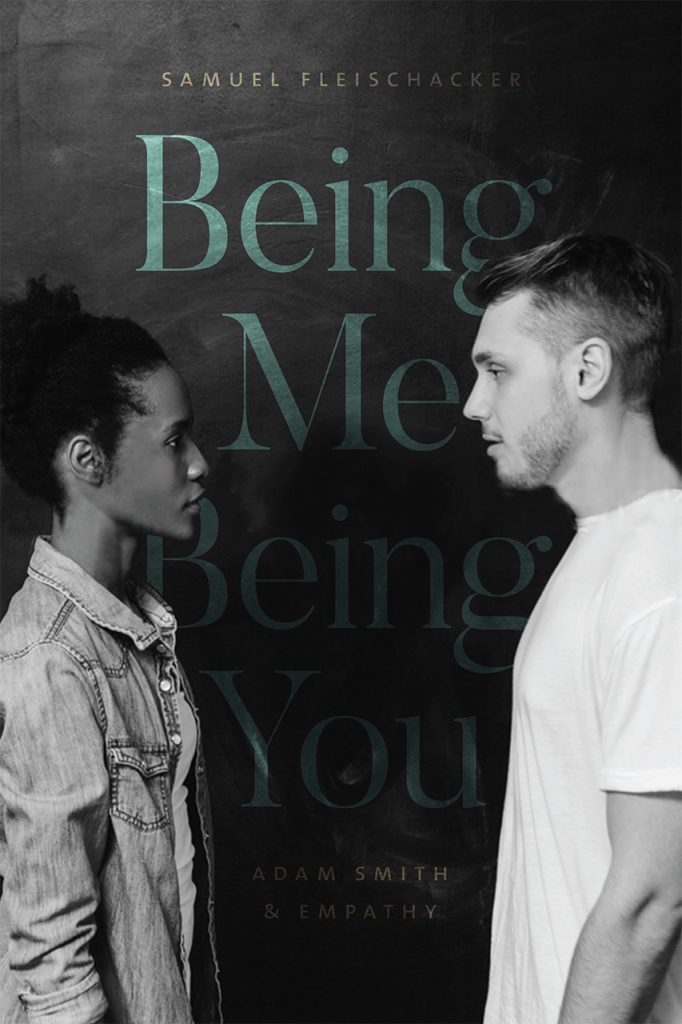6 Questions with Samuel Fleischacker, author of “Being Me Being You: Adam Smith and Empathy”
In his new book, Samuel Fleischacker delves into the work of Adam Smith to draw out an understanding of empathy that respects both personal difference and shared humanity. We sent him a few questions to learn more about Smith, empathy, and how it all relates to our world today.
Your book uses the philosophy of Adam Smith to explore the nature and value of empathy. To start us off, can you give us a quick introduction to Smithian empathy?
Smithian empathy is the kind of shared feeling that arises when I imagine myself into your situation. David Hume had understood empathy (what he and Smith called “sympathy”—the word “empathy” wasn’t invented until after their time) as my feeling whatever you feel. Smith understands it as my feeling what I think I would feel if I were you, in your situation. Hume’s empathy is a kind of contagious feeling—I “catch” your feelings, whether of sadness or of joy, whether I want to do that or not. Smith’s empathy requires more action on our part and depends on imagination. I try to show that Smith’s kind of empathy is deeper and more important to morality.
What drew you to Adam Smith, and to the topic of empathy in particular?
Smith is extremely famous, but I think Smith is vastly different from the popular image of Smith—the supposed champion of selfishness, who defended a ruthless capitalism—and indeed is someone who can help us work against the selfishness that is rampant in our modern world. I also think he is a thoughtful, nuanced theorist of empathy who avoids the simplifications of those who imagine that sharing feelings with other people will solve all our moral problems. He’s a wonderfully sensible figure to bring to our modern moral debates.
The world Smith inhabited—eighteenth-century western Europe—was vastly different from our own. How does his philosophy speak to contemporary concerns?
Even with all the differences, Smith captures an element of our emotional experience, and our relationships with one another, that remains extremely important today. In fact, the kind of society Smith seems to imagine, in which we are all equals, trying to care for one another and respect one another by sharing one another’s feelings, looks more like our own world than his own. There are some aspects of his thought that are dated, however: I try to bring in feminist perspectives, and a perspective that considers the feelings of animals as well as people, that he did not include.
While you were working on this project, what did you learn that surprised you the most?
I don’t think I realized until I was working on this project that empathy can be a central tool for figuring out what should count as “happiness,” as a political goal: that we can figure out how, as political agents, to count things as “benefitting” or “harming” our neighbors only if we enter empathetically into their moral perspectives. Once I saw that point (central to the penultimate chapter of my book), I realized that empathy could help provide the basis for an entire political philosophy.
Where will your research take you next?
I’m under contract to write a short book surveying all of Smith’s philosophy for a press that is doing a “great philosophers” series, but after that I want to turn to something very different: how Jews can see the Torah as God’s word today, even while accepting all the historical evidence that shows it was written by many authors, over many centuries, rather than given to Moses on Mount Sinai.
What’s the best book you’ve read lately?
No question about that: Christine Korsgaard’s Fellow Creatures—a wonderfully thoughtful, honest, and original exploration of our duties to animals, by a philosopher whose strong Kantian commitments might have led one to think that she couldn’t make much sense of such duties.

Samuel Fleischacker is LAS Distinguished Professor of Philosophy at the University of Illinois at Chicago. He is the author of many books, including On Adam Smith’s “Wealth of Nations”: A Philosophical Companion and, most recently, The Good and the Good Book: Revelation as a Guide to Life.
Being Me Being You is available now on our website or from other booksellers.
